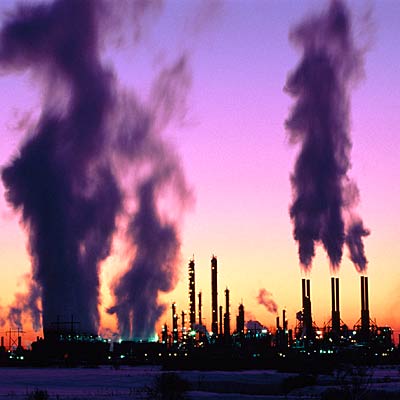We should definitely like to see Pakistan without any environmental issue but currently there are lots of challenges. As in fact we are growing at the rate of more than 8 percent in GDP and creating lots of economic opportunities, this is also growing stress and implications on environment. The constant growth in population is another massive challenge. As we grow economically, we have to decide at this point in time that we ensure better quality of life. At the end of the day, when we have more money but our quality of life suffers and we can’t breathe and drink purewater; then it is not worth it.
Now the Government must show scores of commitment to guarantee that as we grow, we also ensure that the quality of life of our citizens is made better and we, as a country, might be called an environment friendly country. The government should announce the ‘National Environment Policy’ with considerably increase in the budget for environment.
Let us have a look at some of our burning environmental issues in Pakistan.
Major Environmental Issues in Pakistan
1. Need for tree plantations in urban centres – There is no doubt that planting trees help in maintaining good environment. Trees in urban centres help clean environment and reduce pollution. Islamabad, for instance, is one of most protected cities of the world with lot of vegetation and clean healthy environment. So there is need to plant trees in other cities like Islamabad.
We do plant lots of trees every year but the problem is the nurturing of the plants. Trees must be considered as an essential item of environmental service. Even in our religion, trees have been given enormous importance.
2. Cutting of forests – A lot number of forest trees are being cut in northern areas for timber as well as fuel wood. People must not cut trees and use wood as fuel. There are various biodiversities, climate change and other environmental issues which are linked with forestry.
In 1992 Government announced a policy against forest cutting and the cutting of forest was banned but that policy doesn’t seem to have been successful. It is suggested that the government should pass legislation for a sustainable harvesting of forest so that there’s a controlled management plan through which forestry can be saved. Local community also has to understand the value of forests.
We must also develop the strategy for carbon financing at policy level. It is a very innovative instrument across the world where you can do is that we provide value to the trees because trees absorb carbon dioxide from the air. Through this mechanism the developed countries of the world are going to provide financial aid in this regard. The government should announce the strategy to make sure that investment comes in and trees are treated as the environmental commodity not just as the item of fuel.
3. Pollution from factories – We need a cooperative compliance from the factories. The Federation of Pakistan Chamber of Commerce and Industry (FPCCI) should take a lead in this regard. It is the time to be strict with the industries that are not compliant. Now there’s a lot of pressure on factories from law of the land and from buyer because buyers are not buying from the parties who are not meeting environmental criteria. After the implementation of WTO, we have to meet the environmental standards and unless we do that we cannot export our goods abroad.
Environment is going to be a non-tariff barrier for all our exports and sooner the industries realize this the better it would be for them. There is also pressure from the lenders; almost all the banks of the world say that the industries that don’t meet the environmental criteria will not be given money. We must try to enforce the law of land and for that we have to start a voluntary self-monitoring program because it is not possible to send inspectors to every industry in the country. The industry owners should take the responsibility and provide data in this regard to relevant government agencies.
4. Greenhouse effect & Pakistan – The planet has been affected in current times with the greenhouse gasses which is detrimental to maintaining life and sustainable environment on earth. Pakistan is a very small contributor in greenhouse effect; Pakistan contributes only 0.2 % greenhouse gases of the whole world.
Pakistan is very much aware about it and has taken lead on this issue at the international level. Pakistan is party to the “Kyoto Protocol”, The Kyoto Protocol is a document signed by about 180 countries at Kyoto, Japan, in December 1997. The protocol commits 38 industrialized countries to cut their emissions of greenhouse gases between 2008 to 2012 to levels that are 5.2 per cent below 1990 levels. Pakistan needs to develop a strategy and attract investment to come to Pakistan on this issue. The industries in Pakistan should also be involved; if one actually invests in projects and get carbon credit that is going to be credited on commodity exchange. It is the first environmental commodity of the world and the predictions of the World Bank are that this market is going to be somewhere in the range of 5 to 10 billion dollars a year on exchange on this carbon emission.
5. Carbon monoxide emissions in Megacities – Carbon monoxide emission levels in Karachi and Lahore have considerably exceeded WHO’s recommended levels. It however happens only during crowded hours not 24 hours a day. We should be concerned about it and a Clean Air Program must be initiated to ensure safe level carbon monoxide emissions especially in megacities.
6. High Pollution in Karachi – One can see so much pollution (noise pollution – air pollution) in the city. The main difference is of population; Karachi is a very crowded city housing people from all parts of the country. Besides other dilemmas, we have the problems of transport and industrial pollution because we are economically growing very fast and all these issues arise from that. Karachi’s main issue is air and noise pollution which again is linked with the increase in transport on the roads. Getting a car has become so easy with the emergence of bank-leasing options. It is though a good sign as far as growing economy is concerned but on the other side, due to lack of infrastructure, pollution issue has increased which is quite alarming. To tackle the situation we need to develop a ‘Clean Air Program’. Major part of this program should include converting public transport on to CNG and removing 2 strokes engines like rickshaws & converting them to 4 strokes engines etc.
7. Running of old vehicles on road – It is also one of the causes of air pollution as these cars are not discarded and thus add their share in increasing the pollution. The “Clean Air Program” should also include old vehicle retiring program. In developed countries the older the car gets the more tax they have to pay. This incentive urges them not to keep old vehicles on road. In Pakistan, low income groups keep old vehicles that have no accurate standard of pollution controlling. We also need to strengthen the motor vehicle testing program in which private sector should be invited to setup testing stations and it should be made mandatory for cars to get fitness certificate every year without which they should not be allowed to come on roads.
8. Exploiting IT technology for Environment Protection – Government is hardly using IT technology in this regard. There must be software programs developed for registering industrial data on environment. This program should be linked to every industry with the Internet and it may be given access to a centralized database in Islamabad. Other than that, the government can also be advised that all the ministries should start adopting similar IT programs and train their staff for e-governance. In this way, the IT technology can be exploited productively.
9. Demand for Environmental Managers – There is a lot of demand for environmental managers especially from the lenders i.e. World Bank and ADB. All these multilateral banks want to lend to Pakistan as well as want to ensure that the projects are also environmentally capable but we have very little proper professional capacity. NGOs have very good work and capacity with regards to advocacy and raising awareness but they are not qualified researchers as such. We need to opt for environmental studies in our universities.
Youngsters, both male/female, should do Masters in environmental studies as this field has a great future in Pakistan. The government is increasing environment budget and they would need lots of people who are qualified in environmental studies. It is a new field and is going to grow without any doubt. As the world is also growing, it will create so many environmental challenges and lots of environmental managers would be in great demand in coming years. Universities in Pakistan, i.e. Karachi University, Punjab University, Quaid-e-Azam University and few other private sector universities are offering programs in environmental studies. So it is highly recommended that youngsters, both male/female, should go for environmental studies.
10. Message for the youth – This environmental movement is your movement and we can fight environment degradation through a movement because of the young people of Pakistan. If we want to make a better Pakistan for upcoming generation, youngsters, both male/female, should take part actively and learn about the environmental issues and try to tackle the problems. One of the best solutions to the environment is to change our bad habits of wastage of water, electricity and dispersal of garbage etc.
Let’s think global but act local.
Author: Tahir Hasnain is a veteran researcher, writer and development practitioner serving the non-government development sector since two decades. Currently he works for Shirkat Gah as Programme Manager, Environment & Livelihood. He can be contacted at – @khi.sgah.org.pk




